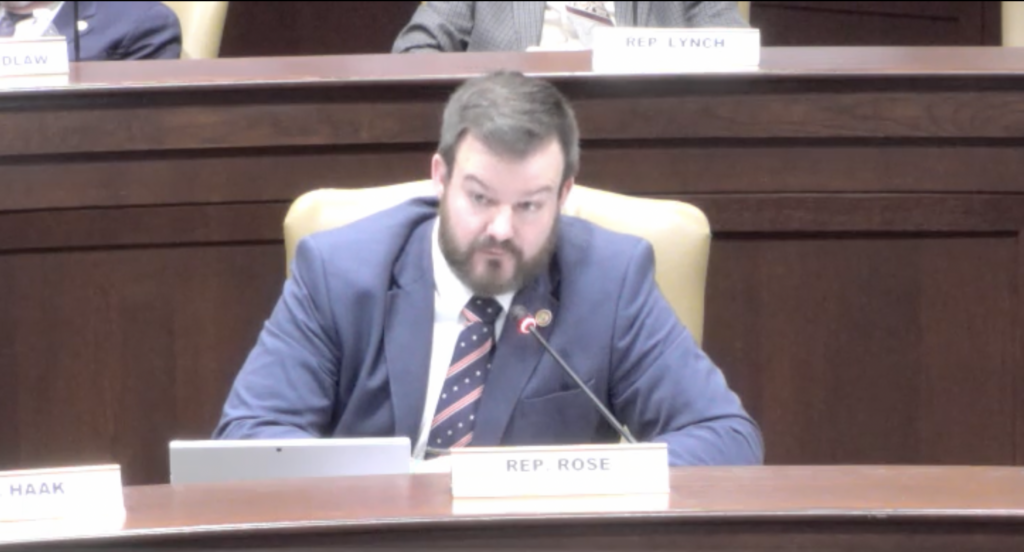Arkansas lawmakers question implementation of federal refugee resettlement program

Rep. Ryan Rose, R-Van Buren, questions the state's participation in a federal refugee resettlement program during a legislative meeting on April 25, 2024. (Screenshot courtesy of the Arkansas Legislature livestream)
This story was updated at 10:45 a.m. on April 26, 2024 to include additional comments from the Department of Human Services.
Arkansas lawmakers on a split vote approved an amended Department of Human Services appropriations bill Thursday and promised continued discussion about the state’s involvement in a federal refugee resettlement program.
The Joint Budget Committee advanced an amended version of House Bill 1077 that changed some appropriations for DHS’ Division of County Operations, but the refugee program’s appropriation remained at $272,846.
Van Buren Republican Rep. Ryan Rose said his qualms about DHS issuing a $65,000 subgrant to the state’s social services designee for the refugee program, Canopy Northwest Arkansas, shouldn’t “torpedo” the Division of County Operations’ budget.
DHS spokesman Gavin Lesnick said the department has worked with Canopy NWA for several years, but the subgrant, which is limited to data services, started in 2023. No funding was provided to Canopy prior to that, he said.
Rose said after this contract ends, the Legislature should not send more money to the nonprofit organization.
“For a number of us, the challenge is we have significant concerns with the funding going to an organization that has the reputation that it does in this arena and that the only security we have on these individuals who come into our state is that they’re federally vetted,” Rose said. “That’s the only kind of outlier there is, hey, we should feel comfortable because they’re federally vetted, which doesn’t give me any comfort.”
Division of County Operations Director Mary Franklin said vetting by the U.S. State Department typically lasts about two years and some applicants have lived in refugee camps as long as 15 years before starting that vetting process. She also noted that if officials discover significant criminal history, refugees would not be allowed to continue the process.
Rose told the Advocate concerns have been voiced by legislators and local residents about the impact of refugee resettlement and the transparency of organizations involved, such as Canopy NWA, which has resettled hundreds of refugees.
“This has raised questions about potential strains on resources, infrastructure and social services in our state,” Rose said. “Additionally, there are concerns about the ideological alignment of organizations like Canopy NWA with the values and priorities of our communities.”
GET THE MORNING HEADLINES DELIVERED TO YOUR INBOX
The federal Office of Refugee Resettlement was established by the Refugee Act of 1980. Individuals granted refugee status by the U.S. Department of Homeland Security are brought to the United States by the State Department, according to the Federal Register. Voluntary agencies and the ORR help resettle refugees, who are eligible for benefits and services when they arrive in the country.
As Human Services’ social services designee, Canopy NWA can help refugees get settled by assisting them with housing or accessing required health screenings, Franklin said. Meanwhile, state agencies can coordinate the distribution of federal funds through cash and medical assistance to eligible refugees for up to 12 months after they enter the United States.
Franklin said the cash assistance and eligibility requirements for refugees are the same as those for the Temporary Assistance for Needy Families (TANF) program. The amount is $81 a month per individual with a limit of $523 per month regardless of household size.
In response to lawmakers’ questions about the state’s partnership with Canopy NWA and its continued participation in the federal program, DHS Secretary Kristi Putnam said that under its current arrangement, the state is able to designate an agency to provide data about refugees resettling in Arkansas.
“Without that ability to make that designation, if Arkansas were to opt out completely, we would lose any ability that we have to have insights and information and coordination with the agency to know what kinds of outcomes there are, the locations where people are resettling. We would not have that information,” Putnam said.
Franklin said 169 refugees resettled in Arkansas in federal fiscal year 2023. For fiscal year 2024, which began in October, that number is currently 130.
The number of refugees admitted to the U.S. is controlled by the federal government. President Joe Biden in September set a refugee admissions target of 125,000 for fiscal year 2024. The U.S. has admitted more than 3 million refugees since the passage of the Refugee Act of 1980.
The post Arkansas lawmakers question implementation of federal refugee resettlement program appeared first on Arkansas Advocate.

